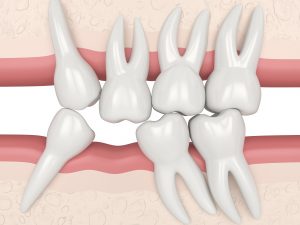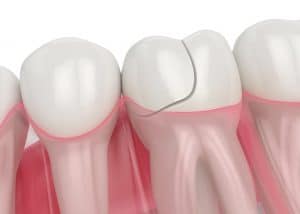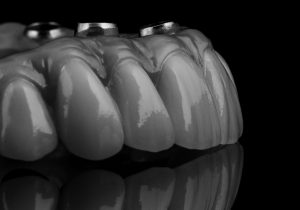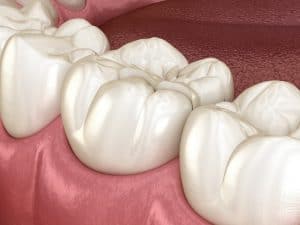 If you’ve never lost a tooth before, then experiencing tooth loss can be a devastating thing. It’s too late to save the tooth, and another won’t grow in its place, which means replacing the lost tooth is the only way to restore that part of your bite’s function. Fortunately, modern tooth replacement options are more lifelike in appearance and effective in their function than they’ve ever been. In addition, the use of biocompatible treatments such as dental implants, which replace your lost teeth roots, can help many patients reduce or prevent the most devastating consequences of tooth loss. (more…)
If you’ve never lost a tooth before, then experiencing tooth loss can be a devastating thing. It’s too late to save the tooth, and another won’t grow in its place, which means replacing the lost tooth is the only way to restore that part of your bite’s function. Fortunately, modern tooth replacement options are more lifelike in appearance and effective in their function than they’ve ever been. In addition, the use of biocompatible treatments such as dental implants, which replace your lost teeth roots, can help many patients reduce or prevent the most devastating consequences of tooth loss. (more…)
3 Minimally Invasive Ways to Fix a Tooth
 The problem with tooth damage is that it has to be addressed as soon as possible to prevent it from getting worse. That’s true of most oral health concerns, but when your tooth structure has become compromised, it means your risks of losing it and experiencing even more concerns will continue to get higher. Fortunately, fixing your tooth could be simpler and more convenient than you expect. With a variety of customizable treatment options, we can help design a minimally invasive plan for restoring and preserving the undamaged part of your tooth’s natural tooth structure. (more…)
The problem with tooth damage is that it has to be addressed as soon as possible to prevent it from getting worse. That’s true of most oral health concerns, but when your tooth structure has become compromised, it means your risks of losing it and experiencing even more concerns will continue to get higher. Fortunately, fixing your tooth could be simpler and more convenient than you expect. With a variety of customizable treatment options, we can help design a minimally invasive plan for restoring and preserving the undamaged part of your tooth’s natural tooth structure. (more…)
Need Tooth Extraction? Here’s How to Know
 Sometimes, it’s easy to tell something is wrong with one or more of your teeth, and that seeking dental treatment as soon as possible is probably a good idea. However, knowing exactly what’s wrong, or how best to treat it once you’re at your dentist’s office, isn’t so easy. For example, many people can experience severe oral health concerns without realizing just how severe they are, or how involved treating the condition may be. Today, we take a look at a few signs that might indicate your trouble is severe enough to require tooth extraction. (more…)
Sometimes, it’s easy to tell something is wrong with one or more of your teeth, and that seeking dental treatment as soon as possible is probably a good idea. However, knowing exactly what’s wrong, or how best to treat it once you’re at your dentist’s office, isn’t so easy. For example, many people can experience severe oral health concerns without realizing just how severe they are, or how involved treating the condition may be. Today, we take a look at a few signs that might indicate your trouble is severe enough to require tooth extraction. (more…)
How to Stop a Root Canal from Getting Infected
 Most of the talk about preventing tooth decay involves stopping it from ever developing. However, tooth decay remains the most common oral health concern for most patients of all ages, and when it develops, the more pressing concern is preventing it from becoming more severe. If it does, then the decay that started in your main tooth structure can quickly become a threat to the inner tissues, nerves, and blood vessels of the tooth. Today, we explain how to stop a root canal from becoming infected by tooth decay, and how to save your tooth by treating it as soon as possible if it does. (more…)
Most of the talk about preventing tooth decay involves stopping it from ever developing. However, tooth decay remains the most common oral health concern for most patients of all ages, and when it develops, the more pressing concern is preventing it from becoming more severe. If it does, then the decay that started in your main tooth structure can quickly become a threat to the inner tissues, nerves, and blood vessels of the tooth. Today, we explain how to stop a root canal from becoming infected by tooth decay, and how to save your tooth by treating it as soon as possible if it does. (more…)
What Implants Can Do for Your Custom Denture
 There are many good reasons why dentures have long been a go-to solution for patients who’ve experienced complete tooth loss (also known as edentulism). The ability to restore your entire dental ridge with a row of durable, highly lifelike replacement teeth makes dentures essential in helping them regain their smiles and better quality of life. Today, modern dentures can also do more for rebuilding your smile than closely mimicking your healthy, natural tooth structure. When supported by a series of dental implants, they can also help reestablish the functions of your lost teeth roots, which can have significant advantages for the future of your oral health. (more…)
There are many good reasons why dentures have long been a go-to solution for patients who’ve experienced complete tooth loss (also known as edentulism). The ability to restore your entire dental ridge with a row of durable, highly lifelike replacement teeth makes dentures essential in helping them regain their smiles and better quality of life. Today, modern dentures can also do more for rebuilding your smile than closely mimicking your healthy, natural tooth structure. When supported by a series of dental implants, they can also help reestablish the functions of your lost teeth roots, which can have significant advantages for the future of your oral health. (more…)
How to Restore a Severely Damaged Tooth in One Day
 Using technology to customize and enhance modern treatment options is an important part of modern dentistry. For example, the use of solutions like digital imaging and onsite CAD/CAM technologies have helped vastly improve the results and procedures of many traditional dental treatments, such as the placement of a custom-designed dental crown. Our advanced CEREC same-day dental restoration system can allow us to design, create, and place your highly lifelike dental crown in just one visit, so you can enjoy the benefits of restoring your severely damaged tooth much sooner. (more…)
Using technology to customize and enhance modern treatment options is an important part of modern dentistry. For example, the use of solutions like digital imaging and onsite CAD/CAM technologies have helped vastly improve the results and procedures of many traditional dental treatments, such as the placement of a custom-designed dental crown. Our advanced CEREC same-day dental restoration system can allow us to design, create, and place your highly lifelike dental crown in just one visit, so you can enjoy the benefits of restoring your severely damaged tooth much sooner. (more…)
Why More People Have Tooth Fillings than You Know
 Some concerns that your teeth can develop may be more common than you realize. For example, if you notice that your teeth are stained, you can feel better knowing that you’re not alone, and most people experience tooth stains at some point in their lives. The same can be true for cavities, which are a result of tooth decay and can affect almost anyone at some point. However, thanks to advanced treatments such as tooth-colored fillings, treating a cavity can be more discreet than you might expect. (more…)
Some concerns that your teeth can develop may be more common than you realize. For example, if you notice that your teeth are stained, you can feel better knowing that you’re not alone, and most people experience tooth stains at some point in their lives. The same can be true for cavities, which are a result of tooth decay and can affect almost anyone at some point. However, thanks to advanced treatments such as tooth-colored fillings, treating a cavity can be more discreet than you might expect. (more…)
If Your Snoring Is a Problem
 Snoring is the kind of problem that can often seem more annoying than serious. As such, people who snore often may not take addressing the problem very seriously. However, chronic snoring can be more problematic for your overall wellbeing than you may realize. In some cases, the snoring may not even be the problem itself, but rather a symptom of a much more serious underlying sleep disorder. Today, we examine why your snoring may be a problem, and how we may be able to help you sleep more restfully by helping you stop snoring. (more…)
Snoring is the kind of problem that can often seem more annoying than serious. As such, people who snore often may not take addressing the problem very seriously. However, chronic snoring can be more problematic for your overall wellbeing than you may realize. In some cases, the snoring may not even be the problem itself, but rather a symptom of a much more serious underlying sleep disorder. Today, we examine why your snoring may be a problem, and how we may be able to help you sleep more restfully by helping you stop snoring. (more…)
What Having TMJ Disorder Means, and How to Treat It
 For many of the most common oral health concerns, such as cavities and gingivitis, the impacts they can have on your oral health are similar to the impacts they can have on others. While the specifics of your tooth decay or gum disease may differ, the condition itself follows a progressive pattern that’s common for most patients. However, TMJ disorder (or temporomandibular joint disorder) is unique in many ways, including the specific nature of the condition and how it impacts your oral health and bite function. (more…)
For many of the most common oral health concerns, such as cavities and gingivitis, the impacts they can have on your oral health are similar to the impacts they can have on others. While the specifics of your tooth decay or gum disease may differ, the condition itself follows a progressive pattern that’s common for most patients. However, TMJ disorder (or temporomandibular joint disorder) is unique in many ways, including the specific nature of the condition and how it impacts your oral health and bite function. (more…)
Things to Consider if You Grind Your Teeth a Lot
 Bruxism, or constant teeth-grinding, is the kind of problem that you can know you have, and yet not realize it’s a problem. After all, most people grind their teeth occasionally, often as a nervous habit or a reaction to stress or anxiety. However, having bruxism means more than just grinding your teeth once in a while. It’s an underlying oral health condition that can force your teeth to grind against each other much more often than you may notice. Today, we examine a few things you should consider if you grind your teeth a lot, and when you should take the condition seriously enough to seek treatment for it as soon as possible. (more…)
Bruxism, or constant teeth-grinding, is the kind of problem that you can know you have, and yet not realize it’s a problem. After all, most people grind their teeth occasionally, often as a nervous habit or a reaction to stress or anxiety. However, having bruxism means more than just grinding your teeth once in a while. It’s an underlying oral health condition that can force your teeth to grind against each other much more often than you may notice. Today, we examine a few things you should consider if you grind your teeth a lot, and when you should take the condition seriously enough to seek treatment for it as soon as possible. (more…)


